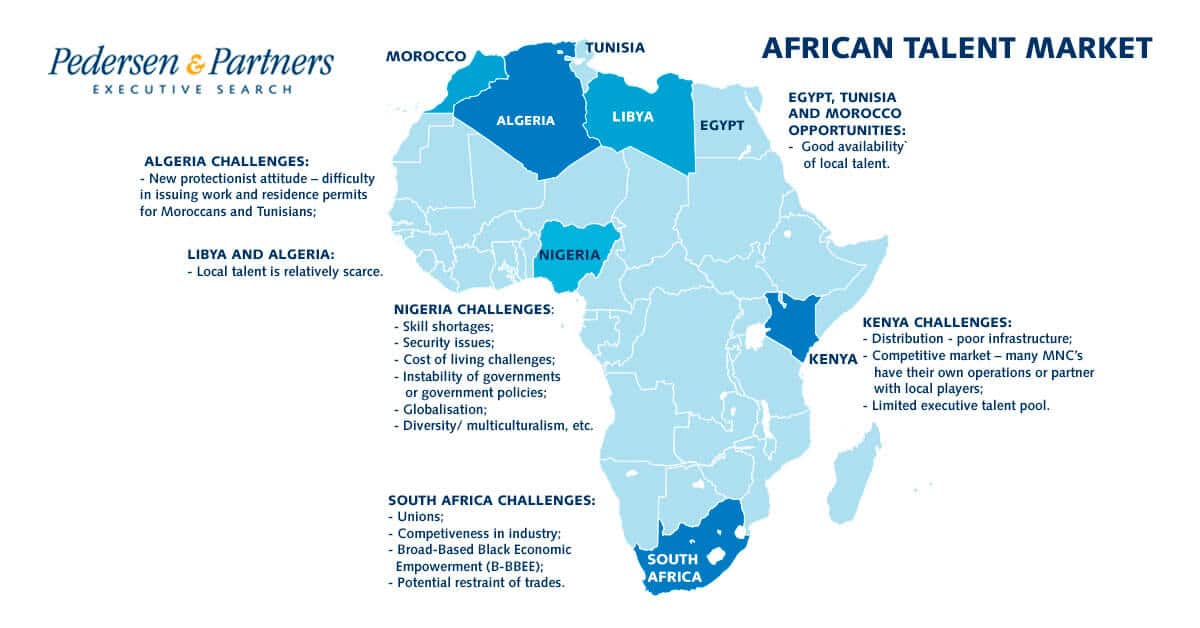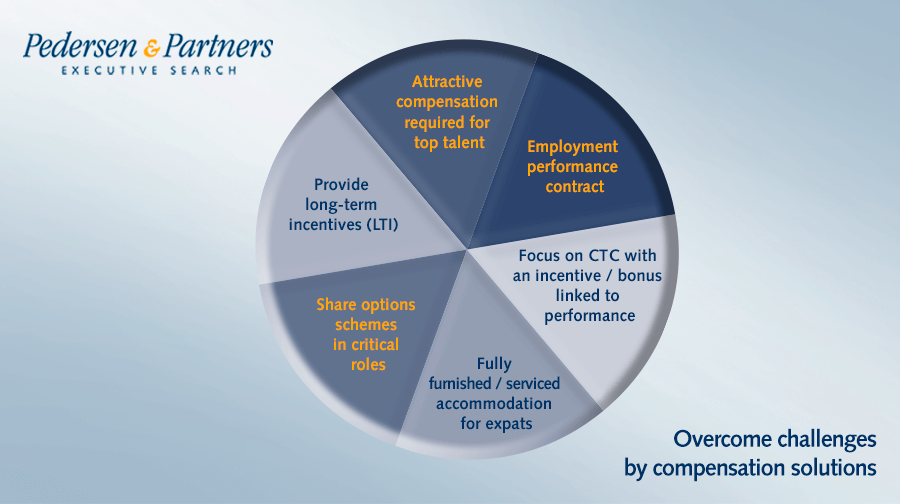Middle East & Africa headquarters in Dubai – challenges and opportunities
Dubai, United Arab Emirates – Focusing on the Consumer sector in particular but also taking a number of other sectors into consideration, we have seen an increasing number of international firms moving their Middle East & Africa headquarters to Dubai, and in the process facing the inherent challenges of hiring senior executives across North and Sub-Saharan Africa.

For many international FMCG firms in the Middle East, attracting world-class talent can be challenging. This is still a developing region, many companies are not yet fully mature and we are seeing increasing inflation and high rents. There are many practical and administrative processes involved in the relocation process, which can be a lengthy procedure and must be closely monitored right up to the start date.
However, attracting the best talent for Africa is proving to be even more of a challenge. There is a general misconception that Sub-Saharan Africa can be treated as a single country, whereas in fact it is 54 unique and very different nations. Each African country has its own issues of race, ethnicity and religion, and what works in one will not necessarily work in others. Political instability, corruption, and currency devaluation are issues that appear in one form or another across the continent. Expatriates are generally welcomed, although work permits are increasingly an issue. World-class talent does exist in many African countries, but may not always be appropriate for multinationals. Salaries are often higher than for equivalent positions in Europe; there is very little accurate benchmarking and job titles can mean very little; these are just some of the challenges facing firms with MEA headquarters in Dubai today.
Infographic: African Talent Market

The recruitment challenges in many of the African local talent markets are often similar, ranging from general skills shortages and security issues to the cost of living and infrastructure challenges that are noted in Nigeria and Kenya. In more developed markets such as South Africa, some of the major impediments to the development of human capital development are due to the unions and the resulting potential restriction on trades and industry competitiveness. Talented local specialists are widely available in Egypt, Tunisia and Morocco, but the freedom of movement of Tunisians and Moroccans has become more difficult recently with the protectionist policies enforced by Algeria.
For some countries in Northern Africa, native talent can be found working outside the region, e.g. in France or the Gulf, but these experts are often reluctant to repatriate at all, and in any case not without considerable financial inducement to offset perceived hardship. However, cross-sector movement is not uncommon, and can even be seen across unrelated sectors. Although compensation levels are considered moderate throughout the region, there is a wide variance in salaries, with some functional areas (such as finance management) much better paid than others.
So, how do firms overcome these challenges and attract the best possible talent to drive their African operations forward? Employers in high-risk industries and countries must rely heavily on compensation packages, with a great focus on bonuses, long-term incentives and performance-linked share option schemes. They will also need to include fully furnished and serviced accommodation options for expats and their families, with assurances of security.
Chart: Overcome challenges by compensation solutions

Once on board, the expat talent must be empowered and supported by a strong management structure put into place. These professionals will want to be placed in short-term key roles for two to three years, so that they can develop professionally and financially, and are likely to demand a culturally integrated approach coupled with a strong business strategy. They will demand the best Human Resources practices for their teams and the best business practices for their operations, as few will wish to stay long-term in the same place. This is where the alignment between the organisational culture and the personal and professional aspirations of the employee will play a great role. If both these pillars can be bridged by adaptability, flexibility and willingness to be open about each other’s aims, a greater probability of employee engagement and subsequent growth and development can almost be guaranteed.
When developing a long-term talent strategy, employers must engender a preference for developing and nurturing local talent to be primed for future leadership responsibilities, as transitions frequently cause serious talent turnover and turbulence. Executive education programmes fortified by targeted mentorship projects would serve as the best greenhouse where new talent can sprout, be selected early on and invested in. This would require management attention and capital resources to be fully dedicated to a medium to long-term commitment, an effort that would be appreciated by the talent deficit-ridden country in itself.
An effective and attractive employer value proposition will consist of a combination of high and low components that would not only secure the talent, but will also ensure its retention. An important pillar of the proposition will reside in well-defined and customised professional development plans. The highest-level executives can also diversify the composition of the local and regional boards of their new employer, and their contribution can be valuable both for the local know-how expertise, and for the MNC’s global approach towards talent acquisition. Making a priority out of devising a comprehensive, multi-faceted and flexible talent attraction strategy specifically directed at the African professionals will allow the companies willing to invest in this endeavor to save millions along the way.
Pedersen & Partners is one of the fastest-growing, fully integrated Executive Search firms worldwide; it is 100% owned by its partners who all work full-time to serve its clients. The firm celebrated its 15th anniversary in January 2016, and to mark this occasion, it has created a timeline web page, featuring key milestones for the firm’s development and has released an anniversary video.
 Andrea Williams is a Client Partner based in Dubai. Ms. Williams brings over 17 years of extensive Executive Search experience with a proven track record of projects across Russia, CIS, the Middle East and Africa with a special focus on the Financial Services, Consumer Products and Retail sectors. Prior to joining the firm, Ms. Williams worked as a Director of a boutique emerging markets Executive Search firm based in Dubai and previously as a Senior Executive Search Consultant for CIS and MENA at an international Executive Search firm based in Moscow. Before entering into the Executive Search and recruitment industry, she worked for three years at investment bank JP Morgan based out of London.
Andrea Williams is a Client Partner based in Dubai. Ms. Williams brings over 17 years of extensive Executive Search experience with a proven track record of projects across Russia, CIS, the Middle East and Africa with a special focus on the Financial Services, Consumer Products and Retail sectors. Prior to joining the firm, Ms. Williams worked as a Director of a boutique emerging markets Executive Search firm based in Dubai and previously as a Senior Executive Search Consultant for CIS and MENA at an international Executive Search firm based in Moscow. Before entering into the Executive Search and recruitment industry, she worked for three years at investment bank JP Morgan based out of London.
 Martin C. Pike is the Managing Director of Sub-Saharan Africa region at Pedersen & Partners. He has developed his career in recruitment and Executive Search since 1998 across the United States, Europe and Africa. Before joining the firm, Mr. Pike was with an international Executive Search firm where he transitioned from Partner to Chief Operating Officer and then the Managing Partner for Sub-Saharan Africa; prior to that he was with a FTSE 150 recruitment firm working across the USA and European markets for nearly a decade. While based in Johannesburg, Mr. Pike has gained experience across all of Africa on executive and board-level searches and has considerable experience in repatriating African talent from abroad back to local markets. Prior to his career in Executive Search, Mr. Pike started in the Financial Services sector.
Martin C. Pike is the Managing Director of Sub-Saharan Africa region at Pedersen & Partners. He has developed his career in recruitment and Executive Search since 1998 across the United States, Europe and Africa. Before joining the firm, Mr. Pike was with an international Executive Search firm where he transitioned from Partner to Chief Operating Officer and then the Managing Partner for Sub-Saharan Africa; prior to that he was with a FTSE 150 recruitment firm working across the USA and European markets for nearly a decade. While based in Johannesburg, Mr. Pike has gained experience across all of Africa on executive and board-level searches and has considerable experience in repatriating African talent from abroad back to local markets. Prior to his career in Executive Search, Mr. Pike started in the Financial Services sector.
Pedersen & Partners is a leading international Executive Search firm. We operate 56 wholly owned offices in 52 countries across Europe, the Middle East, Africa, Asia & the Americas. Our values Trust, Relationship and Professionalism apply to our interaction with clients as well as executives. More information about Pedersen & Partners is available at www.pedersenandpartners.com
If you would like to conduct an interview with a representative of Pedersen & Partners, or have other media-related requests, please contact: Diana Danu, Marketing and Communications Manager at: diana.danu@pedersenandpartners.com
